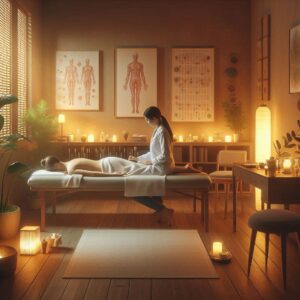Harness the Benefits of Acupuncture to Effectively Overcome Insomnia
Insomnia is a prevalent sleep disorder that can profoundly affect your daily life. It often manifests as difficulty in falling asleep, staying asleep, or achieving the essential deep sleep that your body needs for rejuvenation. This condition can range from short-lived disturbances spanning a few nights to long-term challenges that persist for months or even years. A variety of factors can contribute to the onset of insomnia, including stress, worry, underlying depression, inconsistent sleep patterns, certain medications, excessive caffeine consumption, and various health conditions. By identifying these triggers and understanding their effects, you can create tailored strategies to treat insomnia and restore healthy sleep rhythms, ultimately enhancing your overall health and quality of life.
The persistent struggle with inadequate sleep can have serious consequences for both your physical and emotional well-being. From a health standpoint, chronic sleep deprivation can weaken the immune system, increase your risk for serious health issues such as cardiovascular diseases, elevate susceptibility to conditions like diabetes, contribute to obesity, and impair cognitive functions including memory and attention. On an emotional level, the fallout can include heightened anxiety, exacerbated depression, mood swings, and irritability, all of which significantly impact mental health. Furthermore, difficulties in concentration and decision-making can further complicate the challenges posed by ongoing insomnia. It is crucial to identify and address the root causes of insomnia to mitigate these adverse health effects and restore a sense of well-being.
Understanding Insomnia: Its Complex Nature and Wide-ranging Effects
- Insomnia is a multifaceted sleep disorder characterized by challenges in falling asleep, maintaining sleep, or waking up earlier than desired.
- This condition can arise from numerous factors, including stress, anxiety, depression, poor sleep hygiene, and the effects of certain medications.
- Long-lasting sleep deprivation can severely compromise your overall health, leading to a weakened immune response, increased risk of chronic illnesses, diminished cognitive function, and emotional instability.
- Acupuncture has been shown to improve sleep quality by targeting specific acupoints that help harmonize the body’s energy flow and induce relaxation.
- Extensive research has demonstrated that acupuncture can effectively enhance sleep quality and alleviate various insomnia-related symptoms.
- This age-old practice targets insomnia by reducing anxiety, fostering relaxation, and restoring balance to the body’s energy system.
- Studies indicate that acupuncture may boost melatonin secretion, help regulate the circadian rhythm, and improve overall sleep quality significantly.
- Key acupoints frequently utilized in insomnia treatment include Shenmen, Sishencong, Anmian, and Yin Tang.
- Skilled practitioners use fine needles to stimulate these specific points, promoting relaxation, alleviating stress, and enhancing the quality of sleep.
- Acupoints like Shenmen are renowned for their calming effects, while Anmian is particularly effective for soothing the mind and facilitating deeper sleep.
- Traditional Chinese medicine emphasizes the importance of maintaining a balanced flow of energy and harmony between yin and yang to achieve restorative sleep.
- Incorporating herbal solutions such as chamomile, valerian root, and lavender, along with dietary recommendations like warm, easily digestible foods, can significantly enhance sleep quality.
- Combining traditional Chinese medicine techniques, such as acupressure, herbal treatments, and Qi gong, can further support acupuncture in addressing insomnia.
- During an acupuncture session focused on insomnia, practitioners conduct a detailed consultation to evaluate your sleep habits, lifestyle, and overall health.
- The careful insertion of thin needles into targeted acupoints aims to promote relaxation, reduce stress, and ultimately enhance sleep quality.
- To achieve the best results in managing insomnia, several sessions over weeks or months may be necessary.
- Creating an environment conducive to sleep involves reducing noise and light disturbances, ensuring a comfortable room temperature, and incorporating relaxation practices such as meditation or deep breathing.
- Establishing a regular sleep routine, avoiding caffeine and screens before bedtime, and engaging in regular physical activity can dramatically improve sleep quality.
- Employing stress management techniques, including yoga, meditation, or tai chi, can further enhance your treatment outcomes for insomnia.
- Working alongside healthcare professionals, such as psychologists, nutritionists, or sleep specialists, can help integrate acupuncture with other effective insomnia management strategies.
- Complementary therapies like yoga, meditation, or massage can promote relaxation, relieve stress, and improve sleep quality.
- Addressing underlying health concerns such as anxiety, depression, or chronic pain is crucial for achieving holistic relief from insomnia.
 Exploring the Mechanisms of Acupuncture in Enhancing Sleep Quality
Exploring the Mechanisms of Acupuncture in Enhancing Sleep Quality
Acupuncture has long been regarded as a cornerstone of traditional Chinese medicine (TCM), celebrated for its calming properties and ability to promote restorative sleep. This holistic practice focuses on regulating the body’s energy flow, or qi, by activating targeted acupoints. By positively impacting the nervous system, reducing stress and anxiety levels, and correcting internal imbalances that contribute to insomnia, acupuncture can significantly improve sleep quality. This ancient method not only helps decrease the frequency of nighttime awakenings but also fosters an overall sense of relaxation and well-being, maximizing the restorative effects of sleep.
Extensive scientific research and clinical studies consistently affirm the positive impact of acupuncture on sleep quality. A noteworthy study published in The Journal of Alternative and Complementary Medicine reported that individuals suffering from insomnia experienced significant enhancements in their sleep quality following acupuncture treatment. Additionally, findings published in the Journal of Sleep Research confirmed that acupuncture effectively reduced the severity of insomnia while enhancing overall sleep quality. These compelling outcomes highlight acupuncture’s potential as a safe and natural therapeutic option for those grappling with sleep disturbances.
Identifying Key Acupuncture Points for Optimal Sleep Enhancement
Expert acupuncturists strategically target specific acupoints to effectively combat insomnia and improve sleep quality. These carefully chosen acupuncture points play a vital role in addressing sleep-related challenges. For instance, the Shenmen point, located on the wrist, is renowned for its ability to induce calm and relaxation in both the mind and body. Another significant point, Sanyinjiao, situated on the lower thigh, is believed to nourish blood and yin, leading to reduced anxiety and heightened relaxation. The Anmian point, found behind the ear, is frequently used to alleviate insomnia and promote a restful night’s sleep. The Yintang point, located between the eyebrows, is celebrated for its soothing effects on mental clarity and tranquility.
During acupuncture sessions, practitioners skillfully insert fine needles into the skin at precise depths to stimulate these specific points effectively. This targeted stimulation is thought to help regulate the body’s energy flow, fostering a sense of balance and harmony. Consequently, many individuals report a noticeable reduction in insomnia symptoms and a significant enhancement in sleep quality following treatment.
Understanding the Holistic Principles of Traditional Chinese Medicine for Better Sleep
Traditional Chinese medicine (TCM) adopts a holistic perspective on health and wellness, acknowledging the intricate interconnections within the body’s systems and the importance of balance for optimal health. TCM principles related to sleep emphasize the necessity of restoring internal harmony to facilitate restful sleep. Herbal solutions are often prescribed to correct imbalances that lead to sleep disturbances. Herbs such as valerian root, chamomile, lavender, and passionflower are renowned for their calming properties, aiding in achieving more restorative sleep. These natural remedies not only promote physical relaxation but also contribute to improved overall sleep quality.
In practice, TCM practitioners frequently offer dietary suggestions aimed at bolstering sleep quality. Individuals struggling with insomnia are often encouraged to consume foods that nourish the blood and yin. Foods such as dark leafy greens, nuts, seeds, and seafood are beneficial dietary choices. Additionally, practices like Qigong, tai chi, and acupressure, alongside other TCM therapies, can effectively alleviate insomnia by promoting relaxation, reducing stress, and enhancing overall wellness, ultimately leading to better sleep quality.
 What to Expect During Your Initial Acupuncture Session for Insomnia
What to Expect During Your Initial Acupuncture Session for Insomnia
Upon arriving for your first acupuncture session specifically targeting insomnia, the acupuncturist will conduct a comprehensive assessment of your sleep patterns, overall health, and any underlying factors that may contribute to your sleeplessness. Utilizing their expertise, the acupuncturist will formulate a personalized treatment plan tailored to your individual needs and circumstances.
The acupuncture procedure involves the gentle insertion of fine needles into designated points on your body. Patients are generally encouraged to relax for about 20 to 30 minutes while the needles remain in place. During this period, individuals may experience a gentle tingling sensation or mild discomfort; however, the overall experience is typically described as calming and peaceful, creating an environment conducive to sleep.
The timing and frequency of acupuncture sessions can vary based on the severity of insomnia and individual responses to treatment. While some patients notice improvements in their sleep quality after just a few sessions, others may require ongoing treatment to achieve more sustainable effects.
Making Lifestyle Adjustments to Enhance Acupuncture Outcomes for Insomnia
In addition to acupuncture, implementing specific lifestyle changes can significantly enhance your overall sleep quality. Creating an environment that promotes restful sleep is crucial for optimizing your sleep experience. This includes making your bedroom dark, quiet, and peaceful, ensuring comfortable bedding and pillows, and establishing a calming bedtime routine that signals to your body that it’s time to relax and prepare for a restful night.
Adopting healthy habits can greatly improve sleep quality. This involves following a consistent sleep schedule, steering clear of caffeine and electronic devices in the hours before bedtime, incorporating regular physical activity into your daily routine, and practicing relaxation techniques such as deep breathing or meditation to quiet the mind.
Effective stress management techniques can significantly improve the outcomes of acupuncture treatment for insomnia. Engaging in activities like yoga, meditation, or massage therapy can help alleviate anxiety and promote relaxation. These practices provide essential support to help you unwind, making it easier to both fall asleep and maintain uninterrupted sleep throughout the night.
 Integrating Acupuncture with Other Effective Strategies for Comprehensive Insomnia Relief
Integrating Acupuncture with Other Effective Strategies for Comprehensive Insomnia Relief
With the guidance of a skilled practitioner, acupuncture can become an invaluable component of a holistic approach to managing insomnia, offering essential relief for individuals facing sleep disorders. Collaborating with other healthcare professionals, such as primary care doctors or mental health specialists, is vital for providing comprehensive care for those experiencing insomnia.
By combining acupuncture with complementary modalities such as yoga, meditation, and massage therapy, individuals can formulate a well-rounded strategy to foster relaxation and mitigate stress, ultimately leading to improved sleep quality. These methods can be seamlessly integrated into a personalized treatment plan that caters to each person’s unique needs, ensuring they feel supported and valued.
Furthermore, addressing any underlying health issues that may worsen insomnia is crucial. Effectively managing chronic pain, anxiety, depression, or other medical conditions that interfere with sleep quality can be an essential part of the overall treatment process. Individuals who adopt a holistic approach to their health and well-being are more likely to experience significant improvements in both sleep quality and overall life satisfaction.
In conclusion, insomnia can have a profound impact on both physical and emotional health, underscoring the importance of exploring effective treatment options. A knowledgeable practitioner can harness acupuncture’s benefits to enhance sleep quality by addressing imbalances within the body and instilling a sense of calm. By integrating lifestyle changes, principles of traditional Chinese medicine, and other complementary therapies, acupuncture can significantly improve both sleep quality and overall well-being. This comprehensive approach provides hope and optimism for individuals seeking relief from insomnia.
 Frequently Asked Questions About Acupuncture and Its Role in Alleviating Insomnia
Frequently Asked Questions About Acupuncture and Its Role in Alleviating Insomnia
What Exactly is Acupuncture and What Benefits Can It Offer?
Acupuncture is a time-honored practice rooted in traditional Chinese medicine, where skilled practitioners insert fine needles into specific points on the body to promote the flow of energy and enhance the body’s natural healing mechanisms. This technique is effective in addressing a range of health issues, including insomnia, by restoring balance and harmony within the body.
How is Insomnia Characterized?
Insomnia is a sleep disorder that hinders the ability to fall asleep, remain asleep, or achieve rejuvenating sleep. This persistent condition often leads to daytime fatigue and diminished functionality, making it essential to seek effective treatment options to improve sleep quality.
How Does Acupuncture Aid in Reducing Insomnia Symptoms?
Acupuncture has been shown to positively impact insomnia by re-establishing balance within the body’s nervous system, alleviating stress and anxiety, and inducing a state of relaxation. This approach enhances both the duration and quality of sleep, positioning acupuncture as an effective treatment alternative.
Are There Scientific Studies Supporting the Effectiveness of Acupuncture for Insomnia Relief?
A variety of studies indicate that acupuncture can enhance sleep quality and alleviate symptoms associated with insomnia. While existing evidence supports its benefits, further research is necessary to solidify these findings and draw more definitive conclusions about its efficacy.
What Can I Expect During an Acupuncture Session Focused on Insomnia?
During an acupuncture session, a trained practitioner carefully inserts slender needles into specific points on your body linked to promoting sleep and relaxation. The needles are typically left in position for 15 to 30 minutes while you relax and embrace a sense of tranquility.
Are There Any Potential Side Effects Associated with Acupuncture for Insomnia?
When performed by a qualified and experienced practitioner, acupuncture is generally safe. However, some individuals may experience minor side effects, such as tenderness, discoloration, or slight bleeding at the insertion sites.
Can Acupuncture Serve as a Standalone Treatment for Insomnia?
Acupuncture can be an effective treatment for insomnia, especially when combined with complementary strategies such as lifestyle changes, relaxation techniques, and cognitive behavioral therapy for insomnia (CBT-I), creating a comprehensive treatment plan that addresses various aspects of insomnia.
How Many Acupuncture Sessions Are Typically Needed to Notice Improvements in Insomnia Symptoms?
The number of acupuncture sessions required to see improvements in insomnia varies based on individual circumstances and the severity of symptoms. Many individuals report enhancements in their sleep quality after just a few sessions, while others may need ongoing treatment for long-lasting benefits.
Provided By:
References
If You Only Get 3 Hours of Sleep One Night – What Happens – Themes Quality. https://www.themesquality.com/what-happens-if-you-only-get-3-hours-of-sleep-for-one-night/
Sleep Better with 30 Essential Oils: A Natural Remedy for Insomnia and Restless Nights – Hotnewamapiano. https://hotnewamapiano.com/2023/02/11/sleep-better-with-30-essential-oils-a-natural-remedy-for-insomnia-and-restless-nights/
Migraines Helped by Acupuncture. https://www.ncbi.nlm.nih.gov/pmc/articles/PMC3291665/
The Article: Acupuncture Techniques for Improving Sleep Quality appeared first on Acupuncture Blackpool.
The Article Acupuncture Techniques for Better Sleep Quality appeared first on https://mcrtherapies.com
The Article Acupuncture Techniques to Improve Sleep Quality Was Found On https://limitsofstrategy.com


Your exploration of insomnia and its causes resonates deeply. I’ve personally navigated the challenges of sleepless nights and can attest to how stress and inconsistent sleep patterns can compound the issue. I found acupuncture to be a useful complement to my wellness routine. It not only helped with relaxation but also increased my awareness of how my body responds to various stressors.
It’s so interesting to hear how acupuncture has played a role in your journey with insomnia. I’ve often read that holistic practices can create a deeper connection between the mind and body, and your experience seems to reflect that. It’s fascinating how something like acupuncture not only promotes relaxation but also raises awareness about our physical responses to stress.
I can relate to your experience with stress and sleepless nights; I recently came across some practical methods for managing anxiety that really resonated with me and might be worth checking out for those facing similar challenges.
‘Conquering Anxiety: Powerful Methods for Control’
https://mkpitstop.co.uk/conquering-anxiety-powerful-methods-for-control/.
Your perspective on acupuncture really resonates with me. It’s amazing how these holistic practices can create a bridge between our mental and physical states. I’ve found that when I’m able to focus on my body’s responses during an acupuncture session, it brings a whole new layer of awareness. It’s as if my mind finally gets a chance to catch up with what my body has been trying to tell me all along.
Your insights on the multifaceted nature of insomnia resonate deeply with my experiences. As someone who has grappled with sleep disturbances linked to stress and inconsistent routines, I can attest to the importance of addressing both the symptoms and underlying causes of this condition. It’s intriguing how different factors interplay; for instance, I found that my caffeine intake in the afternoon subtly worsened my ability to relax at night.